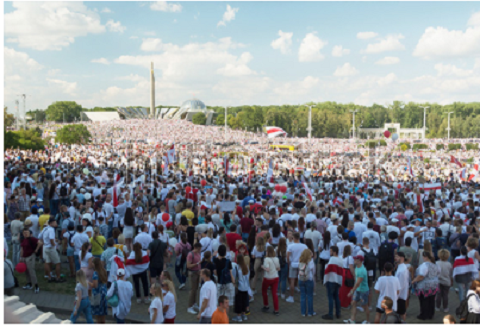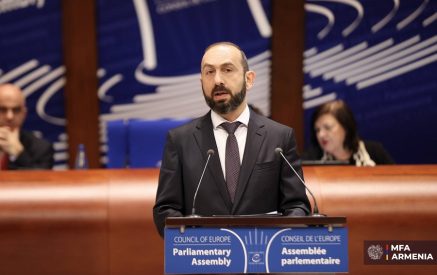The Standing Committee (*) of the Parliamentary Assembly of the Council of Europe (PACE) meeting today by videoconference, adopted the following statement on an urgent need for a democratic, broad-based and inclusive political process in Belarus:
“1. The Parliamentary Assembly’s political dialogue with the representatives of the Belarusian National Assembly, the opposition forces as well as the civil society aims at promoting in Belarus the values and principles of pluralist democracy, rule of law and fundamental rights and freedoms, thus opening the Pan-European acquis for the people of Belarus.
2. The Assembly recalls that its relations with the National Assembly of Belarus date back to 1992, when it was granted Special Guest status. Lack of democratic progress and continued violation of human rights led to the suspension of the Special Guest Status in 1997. The accession process, initiated in 1993, was subsequently frozen.
3. Nevertheless, the Assembly recalls that, although not a member state of the Council of Europe, to date, Belarus has signed and ratified 12 Council of Europe treaties and protocols and has joined four Partial Agreements: the European Commission for Democracy through Law (Venice Commission), the Group of States against Corruption (GRECO), the Enlarged Partial Agreement on Sports and the European Pharmacopeia. Recently, the co-operation was intensified through two successive Action Plans whose implementation is facilitated by the Council of Europe Information Point in Minsk.
Read also
4. While welcoming existing avenues of co-operation which aim at bringing Belarus’s legal and institutional framework closer to Council of Europe standards, the Assembly deplores the lack of respect, by the authorities, of democratic standards and fundamental rights and freedoms.
5. It recalls that, in its past reports on the situation in Belarus, it expressed strong concerns about systemic human rights violations. Furthermore, it notes that the existence of death penalty and the continued practice of execution of death sentences makes Belarus the only European country to use this inhuman and unacceptable punishment which constitutes a major obstacle for the development of our relations.
6. Furthermore, in its reports on the observation of parliamentary and presidential elections, the Assembly has repeatedly highlighted the lack of level playing field in the electoral process that prevented candidates from campaigning on equal footing and did not allow the voters to make an informed, free and democratic choice.
7. Against this background, the Assembly strongly regrets the fact that the presidential election of 9 August 2020, conducted under the existing electoral system, were far from being free and fair and failed to meet international standards for democratic elections and Belarus’s commitments under international human rights legal instruments.
8. The Assembly strongly condemns the excessive use of force by law enforcement and the military against peaceful protestors in the aftermath of the elections and urges the Belarus authorities to put an immediate halt on violence and intimidation, to release all detained protesters and to promptly launch full, transparent and impartial investigation into the multiple cases of police violence and brutality in order to bring to justice all those responsible. This is an essential first step for restoring the confidence of the citizens in the authorities and in institutions.
9. The Assembly expresses solidarity with the courage and determination of the people of Belarus who continue to defend their fundamental rights and freedoms peacefully and responsibly.
10. The Assembly commends in particular women’s active participation in the political process as engaged citizens, voters, leaders and campaigners, and stresses once more that the participation of women in political and public decision-making is a fundamental right and a key condition for justice and democracy.
11. The people of Belarus have demonstrated their commitment to the common values of the European family where they fully belong. Their demand for democratic change and reforms must be met with an open and constructive attitude by the authorities.
12. The Assembly recalls that the Council of Europe’s strategic objective remains the rapprochement and accession of Belarus to the Organisation, its values and principles. It hopes that Belarus will initiate political and democratic reforms and work together with the Assembly and the Council of Europe towards restoring the Special Guest status and resuming the accession process.
13. The Assembly considers that a democratic, broad-based and inclusive national political process, fully involving civil society, needs to be urgently launched in Belarus, as a first step towards a peaceful way out of the current crisis and to open the door for the necessary reforms, starting from the constitutional and electoral reforms.
14. The Assembly reiterates its readiness to support this process – in close co-operation with the Council of Europe advisory bodies, in particular the Venice Commission – by intensifying co-operation with the National Assembly of Belarus, all political stakeholders, as well as the civil society. In this regard, the Assembly welcomes the initiatives of its Committees and calls on the authorities, all political stakeholders and the civil society to fully co-operate with the Assembly rapporteurs.”
——————————————————-
(*) The Standing Committee, which acts on the Assembly’s behalf between plenary sessions, is made up of the President and Vice-Presidents of the Assembly, the chairpersons of political groups, the chairpersons of national delegations and the committee chairpersons, totalling some 60 parliamentarians from the Council of Europe’s 47 member States.
PACE























































